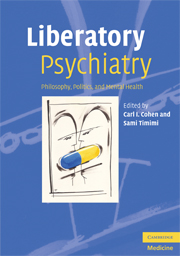Book contents
- Frontmatter
- Contents
- Contributors
- Acknowledgments
- Introduction
- 1 Working towards a liberatory psychiatry? Radicalizing the science of human psychology and behavior
- 2 Power, freedom, and mental health: a postpsychiatry perspective
- 3 Challenging risk: a critique of defensive practice
- 4 Democracy in psychiatry: or why psychiatry needs a new constitution
- 5 German critical psychology as emancipatory psychology
- 6 Psychopolitical validity in the helping professions: applications to research, interventions, case conceptualization, and therapy
- 7 Class exploitation and psychiatric disorders: from status syndrome to capitalist syndrome
- 8 Ecological, individual, ecological? Moving public health psychiatry into a new era
- 9 Children's mental health and the global market: an ecological analysis
- 10 Postcolonial psychiatry: the Empire strikes back? Or, the untapped promise of multiculturalism
- 11 A new psychiatry for a new world: postcolonialism, postmodernism, and the integration of premodern thought into psychiatry
- 12 Neoliberalism and biopsychiatry: a marriage of convenience
- 13 Psychoanalysis and social change: the Latin American experience
- 14 A new psychiatry?
- Index
- References
10 - Postcolonial psychiatry: the Empire strikes back? Or, the untapped promise of multiculturalism
Published online by Cambridge University Press: 25 August 2009
- Frontmatter
- Contents
- Contributors
- Acknowledgments
- Introduction
- 1 Working towards a liberatory psychiatry? Radicalizing the science of human psychology and behavior
- 2 Power, freedom, and mental health: a postpsychiatry perspective
- 3 Challenging risk: a critique of defensive practice
- 4 Democracy in psychiatry: or why psychiatry needs a new constitution
- 5 German critical psychology as emancipatory psychology
- 6 Psychopolitical validity in the helping professions: applications to research, interventions, case conceptualization, and therapy
- 7 Class exploitation and psychiatric disorders: from status syndrome to capitalist syndrome
- 8 Ecological, individual, ecological? Moving public health psychiatry into a new era
- 9 Children's mental health and the global market: an ecological analysis
- 10 Postcolonial psychiatry: the Empire strikes back? Or, the untapped promise of multiculturalism
- 11 A new psychiatry for a new world: postcolonialism, postmodernism, and the integration of premodern thought into psychiatry
- 12 Neoliberalism and biopsychiatry: a marriage of convenience
- 13 Psychoanalysis and social change: the Latin American experience
- 14 A new psychiatry?
- Index
- References
Summary
Introduction
“But the history of all cultures is the history of cultural borrowings.”
(Said, 1993, p. 261)On arriving in Britain in the early 1980s I discovered that I had unexpectedly entered a sort of cultural “limbo” of immigrant doctors and nurses from British ex-colonies, many of which (such as Bangladesh, Mauritius, Sri Lanka, the islands of the Caribbean) had, until then, registered only dimly on our awareness. I began to see how profoundly the view of the world that I had grown up with in India was dominated by the preoccupations of the “white” West (Britain, Europe, and the United States of America), or by the Indian response to these. The nature and legacy of these historical relationships seemed to make “objectivity,” highly prized by our professional trainings, impossible when considering culture. This chapter tracks some of the responses of immigrant professionals such as myself, from the earliest stages of bewilderment, through anger at what we learned to identify as “racism,” and into the relief of contemporary debates about ethnicity and multiculturalism that a social constructionist viewpoint has introduced. It hopes to draw attention to those subjects that seem impossible to discuss in professional settings, obstructed as much by external realities of discrimination based on “ethnic” categories and the uncertainties of professional survival, as by fears about ourselves and our undiscovered prejudices.
- Type
- Chapter
- Information
- Liberatory PsychiatryPhilosophy, Politics and Mental Health, pp. 183 - 204Publisher: Cambridge University PressPrint publication year: 2008
References
- 1
- Cited by



